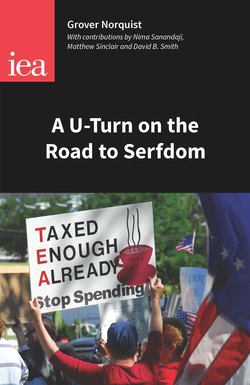Читать книгу A U-Turn on the Road to Serfdom - Grover Norquist Glenn - Страница 7
На сайте Литреса книга снята с продажи.
A U-turn on the road to serfdom: prospects for reducing the size of the state
ОглавлениеGrover Norquist
I am delighted to deliver this year’s Hayek lecture. I ran the campaign in the United States to get President George Herbert Walker Bush to award the Presidential Medal of Freedom Award to Friedrich Hayek, and was delighted when that happened in 1992. Friedrich Hayek wrote The Road to Serfdom describing both the forces that drove the growth of government and the dangers of socialism by any name. Hayek argued in 1944 that it was not just a German problem, it was our problem as well. He predicted the future too well – the recent past we have lived.
Margaret Thatcher promised ‘no U-turn’ in her drive to limit government. What I want to talk about today is this: how do we execute a U-turn and reverse direction on our present road to serfdom here in Britain, in the United States and throughout the world? In the United States, in 1774, when we were still a colony, the government spent 2 per cent of the American colonists’ income. At the same time, the nice people of London had 20 per cent of their income taken in taxes. Over the last several centuries, things have become rougher on both sides of the Atlantic as far as liberty is concerned. The state has grown. In the United States a third of people’s income, on average, goes to the government, and here it has grown as well. How do we turn this around? How do we get from heading in the wrong direction, decade after decade, in terms of the size and scope of government, and begin to move towards more limited government?
In the United States, one of the first things that was important was to get the political parties aligned in a way that made sense. We have two parties in the United States. In Europe, a party can get 2 per cent of the vote in some countries and it can then decide who the prime minister is and be very important. In the United States, if you get 2 per cent of the vote in an election, you’re officially a ‘nut’. You may get to be a radio talk show host after the election, but you don’t fly in the big aeroplane, and you don’t get to serve in Congress. So we divide up into two teams. For many decades, the two teams, the Republicans and Democrats, were largely regional parties.
If somebody told you they were Republican, the only thing you knew about them was that they were born north of the Mason–Dixon Line. You didn’t know if they wanted a bigger government or a smaller government – or anything else. There were conservatives who were Democrats, and liberals1 who were Republicans. There were quite a number of little old ladies in Mississippi who agreed with Ronald Reagan on absolutely everything and voted for George McGovern, because Sherman had recently been quite unpleasant to Atlanta.
1 Editor’s note: this refers to ‘liberals’ in the US sense of the word.
